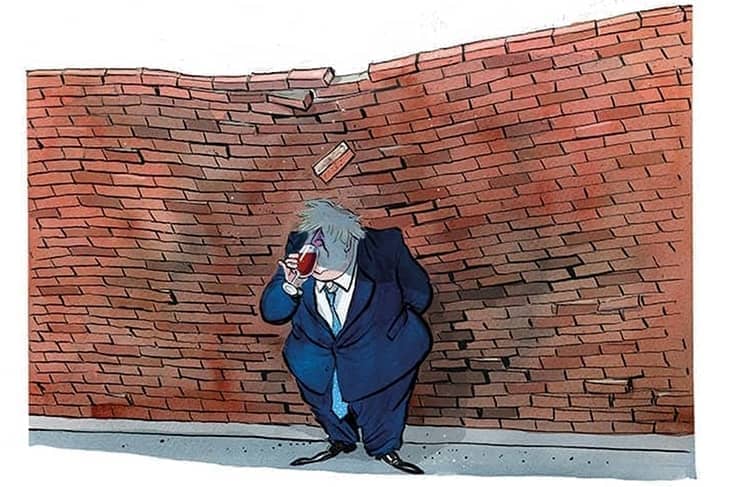Afew weeks ago it seemed that the issue of Downing Street parties over lockdown had been usurped by a more serious matter: what to do about the invasion by a nuclear power of a neighbouring European state. But now partygate is back, fuelled by the news that the Metropolitan Police has issued 20 fixed penalty notices and may announce another tranche of fines at a later date.
Some of the heat has left the whole affair. Several of the letters written to Sir Graham Brady, chairman of the 1922 Committee, demanding a Conservative leadership election were withdrawn at the beginning of the war in Ukraine. The leader of the Scottish Conservatives has withdrawn his own call for the Prime Minister to resign. Nevertheless, partygate continues to present an acute difficulty for Boris Johnson. His survival in No. 10 is still open to question and a good many MPs want him gone.
Johnson and his ministers might try to argue that there are more important things going on in the world right now, and that the fines relate to minor breaking of rules which were anyway ignored by many millions of Britons at some point over the past two years. This line of reasoning is futile. If you pass laws outlawing ordinary human behaviour, prevent people from meeting friends and loved ones and forbid them even from attending the funerals of family members, you must expect outrage and anger when you fail to observe those laws yourself. After chasing so many others through the courts (including the homeless), it’s harder to ask for forgiveness on the grounds that the parties were a minor matter.
The Prime Minister’s most serious error was in sanctioning such highly prescriptive laws in the first place
That said, the Prime Minister’s most serious error was in sanctioning such highly prescriptive laws in the first place. When it emerged that Covid-19 was spreading rapidly among the population in March 2020 there was a need for people to reduce social contact. But most people did this anyway, voluntarily. We have the data to prove this in the dramatic drop in passenger numbers on public transport and the fall in mobility as measured by the tracking of mobile phones. By the time the Prime Minister announced an official lockdown there wasn’t a lot left to lock down – people had pre-empted him.
Just as the public led the country into lockdown, so it led the country out of it. By May 2020, when the first of the parties to feature in the Metropolitan Police’s investigation was held, Covid had almost vanished from London. We now know that the virus was very much less likely to be spread outdoors but the British people understood this from the beginning. They visited beaches, parks and woodlands – and engaged in mass street protests, although the Black Lives Matter demonstrations were a form of lockdown-busting which few seem willing to condemn.
For a group of Downing Street staff who had been working together all day to take to the garden for a drink and some crisps presented virtually no risk to anyone. And it was very much in line with what other people were doing at the time. Downing Street workers would have known this. But it’s worth remembering that it was No. 10 itself that had decided it should be illegal for people to have social gatherings. This wasn’t an edict from anyone else. Policy at that time was coming straight from the Prime Minister’s office with minimal involvement of the cabinet or parliament.
One sadness of the whole affair is that the pandemic could have been a triumph for liberal conservatism. A decade earlier, David Cameron established his Behavioural Insights Team, or ‘nudge’ unit, specifically with the objective of influencing the public without having to pass laws. Yet, come the pandemic, flawed behavioural science was used not to reduce the need for laws but to justify them. Public fears were ramped up so as to suppress any objection to the lockdown rules. Anyone raising the slightest of queries was made to feel that by not toeing the party line, they were contributing to the death toll.
If the Prime Minister is one of those who has been issued with a fixed penalty notice he should pay up and admit his breach. But this alone shouldn’t be the fault that drives him out of office. There are far more concerning issues. Next week, Johnson’s government will add to the cost-of-living crisis by increasing National Insurance – in direct defiance of its manifesto pledge. The money is not for Covid recovery but to subsidise care home costs: a seriously bad decision that suggests Johnson has no plan to avoid a fast-approaching financial crisis.
The Prime Minister’s judgment is not always faulty. He was among the first in Europe to recognise the urgency of the Russia threat and send lethal aid to Ukraine’s army. His instincts in these matters has been more encouraging, as was his rejection of lockdown last Christmas and the speed with which he abolished Covid restrictions.
The fate of his premiership deserves to be decided on more substantial issues than lockdown parties: chiefly, whether he has a plan to get Britain out of the economic mess that we are now hurtling towards.






Comments